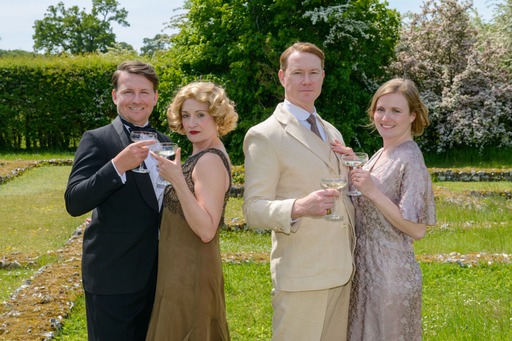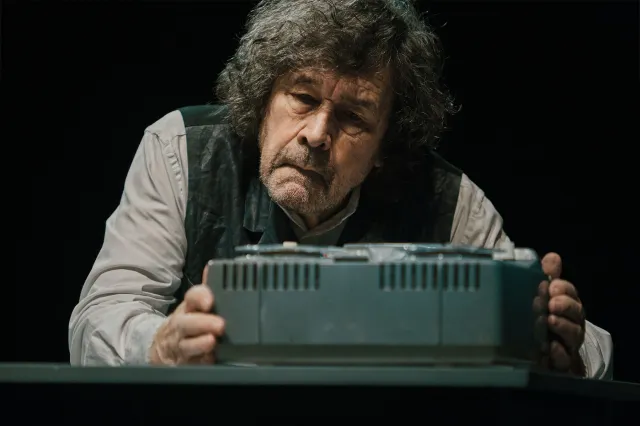Roman Theatre of Verulamium (St Albans)
A 1930s tragicomedy of manners filled with venom and set partly on a balcony should feel right at home in the ancient shell of a Roman amphitheatre. Shouldn’t it? I mean they are both outside, and both involve historic exhibitions of cruelty. OVO and Adam Nichols resurrect one of Noël Coward’s most popular plays in the glowering sunshine.
Running from Late June to middle August this is the perfect romp with an air of sophistication, cocktails, and the looming spectre of domestic abuse and co-dependency. Everyone’s favourite blended tipple. Its premiere in 1930 caused scandal and mixed reviews despite having Coward himself and Laurence Olivier in the cast. All critics at the time mentioned its complexity and many mentioned the need for an exemplary cast to balance the tightrope walk of wit and worry, bloodlust and bawdiness. A play tittering on the shoddy balcony of marriage, metaphorically and physically.
The premise is simple and will most likely seem quite bleak when concluded. Elyot and Amanda divorced 5 years ago. While both on their honeymoons with their respective new spouses, they realise they have booked bordering hotel rooms linked by a balcony… hilarity, caustic jibes, and jolly raucousness follow as the two battle their reignited feelings in the plush Normandy setting. Part clash of personalities part cynical exploration of when love turns sour.
With only four characters and a maid and two locations it is very much Coward’s bouncing brain on show with the script and a lot of leg work for our lead couple. Emma Wright is Amanda, potentially one of my favourite female roles in theatre. Androgynous, comedically immoral, and panther-like. A gay man’s heaven in female form. Wright’s interpretation with a severe blunted bob has moments of flare but gets bogged down with overly grand and languid gestures. Her best moments are the later scenes with her and her ex-husband Elyot (Mat Betteridge) as they ricochet off each other in PJs. They have a blinding spark together, and although butter down the fangs of this deeply unhealthy relationship are certainly engaging to watch. Betteridge gets the English gent spot on, confident in a controversial role. A brutish, unreliable, mischievous, and at times abusive character certainly at odds with modern ideas of romance. But we will touch on that later.
Their spouses are demanding parts in their own way, named by the playwright as “extra puppets, lightly wooden ninepins, only to be repeatedly knocked down and stood up again”. They are the left behind, and Coward puts much less effort into their psychological complexity than the leads, leaving them a little scuppered. Charlie Clee as the devoted yet wet Victor and Grace Bassett as the irritatingly feminine Sybil do their best, however little meat they are given.
Well timed across the board, amusing if not particularly original. Adam Nichols’s directorial choices are mystifying. Firstly, the editions. Characters burst into song at the piano despite a range of vocal abilities or really much explanation. Interestingly none of them sing Coward’s own songs (Some Day I’ll Find You was written for the play specifically) but electro-swing versions of pop songs. Why?
The role of the French maid Louise (Josephine Rattigan) and other moments throughout have an added layer of gratuitous slapstick. This is an energetic and high-class comedy and not a farce, direction should rely on talented actors breathing life into a much-loved script. The bells and whistles should stay very much at home for this production.
Lastly, the proclivity of mainly Elyot but also Amanda for hitting each other is softened so much that it almost seems like a pillow fight, just with fists. Like racism or homophobia in an older script, a director has two choices, recontextualize the issue, or ignore it. I think we know which one I prefer.
The Donmar Warehouse vamped up the violence in the April revival, exposing the brutality of thinking in the early 20th century, but therefore struggled to land some of the comedy. Nichols’s choice to veer off and highlight the jokes might seem wider reaching but is certainly not as arresting. Leaving this production all manic laughter and not very much else. The razor edge always concealed in Coward’s words is dulled and blunted by the stones of the crumbling Roman walls around us. Although as the perfectly timed sunset begins it doesn’t take much imagination to feel oneself on the balcony in Deauville listening to a perfectly horrid set of couples bicker and bite. Flashback 2000 years and the screams of the Christians burnt to death in this very arena blend with the chaotic cries of the final scene, reminding us that theatre and life are merely a circle.
Have a day in the sun surrounded by history? click here!



